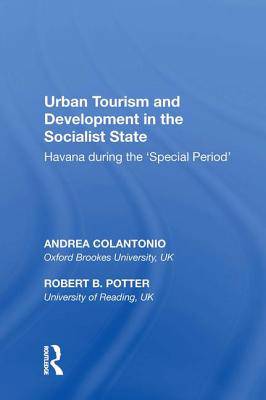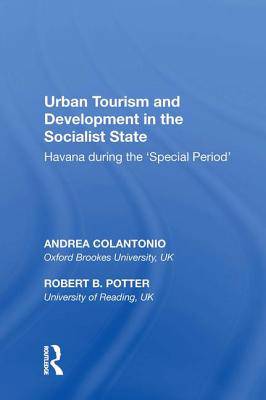
- Afhalen na 1 uur in een winkel met voorraad
- Gratis thuislevering in België vanaf € 30
- Ruim aanbod met 7 miljoen producten
- Afhalen na 1 uur in een winkel met voorraad
- Gratis thuislevering in België vanaf € 30
- Ruim aanbod met 7 miljoen producten
Zoeken
Urban Tourism and Development in the Socialist State
Havana During the �special Period�
Andrea Colantonio
Hardcover | Engels
€ 195,95
+ 391 punten
Omschrijving
After the collapse of the Soviet bloc in 1989, Fidel Castro announced the beginning of aSpecial Period for Cuba. During this time, the Cuban government has been obliged to look outward to other economies of the developed world, specifically targeting tourism as a mechanism for economic growth and development. This book examines the role played by international tourism in Cuba's institutional and economic restructuring and the country's reinsertion into the capitalist world economy. It provides the most comprehensive, in-depth analysis of the economic, social, environmental and political realities which have emerged in Cuba as a result of the redevelopment of urban tourism since the early 1990s. By analyzing the allocation of tourist resources and its impacts, the generation of tourism policy, and the politics of tourism development, it focuses on the political economy of urban tourism in Cuba and the balance of power between domestic and foreign stakeholders involved in the Cuban tourist industry.
Specificaties
Betrokkenen
- Auteur(s):
- Uitgeverij:
Inhoud
- Aantal bladzijden:
- 270
- Taal:
- Engels
Eigenschappen
- Productcode (EAN):
- 9780815398813
- Verschijningsdatum:
- 29/11/2017
- Uitvoering:
- Hardcover
- Formaat:
- Genaaid
- Afmetingen:
- 156 mm x 233 mm
- Gewicht:
- 659 g

Alleen bij Standaard Boekhandel
+ 391 punten op je klantenkaart van Standaard Boekhandel
Beoordelingen
We publiceren alleen reviews die voldoen aan de voorwaarden voor reviews. Bekijk onze voorwaarden voor reviews.











